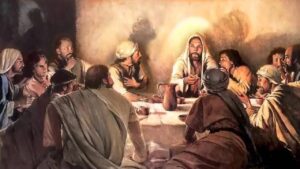
A Meditation on Luke 24:42-45
“They gave him a piece of broiled fish, and he took it and ate before them… then he opened their minds to understand the Scriptures.”
Luke 24:42-43;45
I was once in a seminar for theological educators in which seminarians would present sample lessons to theologians, and open themselves to comments and critique from both their peers and the theologians afterward. One poor soul, a close friend of mine, was matched with a venerable systematic theologian of considerable fame for his sample lesson. His guiding question as he opened the lesson was, “where in this Gospel passage do we see Jesus’ humanity, and where do we see his divinity?” In response to the first half of that question (the passage at hand was an account of Jesus calming a storm in a boat), the venerable theologian, unimpressed by this question, laughed and said dryly, “he got into a boat.” One could also say this, Jesus Christ, the crucified and risen Jesus Christ, ate a piece of fish.
The incarnate Word of God, who was with God in the beginning and is God, consumed broiled meat with his disciples. Mundane as this fact may appear to be, it is profoundly significant to highlight Jesus’ consumption of fish in the Lukan appearance to his disciples for two reasons that I wish to highlight now.
The first reason should be obvious, Christ’s eating shows us the nature of his, and consequently our own, Resurrection. Since Christ’s death and resurrection, well-intentioned heresies, crafted to make intelligible to human reason the impossible but wonderful truth that Christ has really defeated death, have afflicted the Church in various guises. In ancient times the heretics clung to the false notion that Christ’s resurrection was spiritual, incorporeal; the Greek mind has no space or category for crucified and resurrected divine bodies. In modern times, the heretics cling to the hopeless teaching that Christ’s resurrection was a symbol for something else; the memories of his disciples, the endurance of Christ’s teaching and activism, or what have you. For all of their apparent craftiness, these heresies crumble at this simple observation: after he died and rose again Jesus ate some fish with his disciples.
Secondly, in the Lukan appearance to his disciples, we have an apostolic framework for historic worship, in which Anglicans find an early pattern for the worship of God in Word and Sacrament. Pope Benedict XVI summarizes his life’s teaching in this way: “Christianity is not a new philosophy or a new form of morality, but an encounter with the person of Christ.” If you expect to come to church and hear moral lessons, lofty ideals, political action statements, or anything of that sort, I am sorry to tell you that the Church will always disappoint you, at least it always should. When we craft our expectations of the Church around these ideals, we will ultimately leave the Church’s life, along with our children and their children; a fact that is now established with empty cathedrals, and the bars and condos constructed inside empty church buildings which dot the landscape of the West. To be a place for anything other than an encounter with God in Word and Sacrament is simply not the Church’s call, by God’s grace she will always fail unless she proclaims and experiences God’s presence in this way.
The Church and Her worship of God in Word and Sacrament is the ground zero for the kind of transformative encounter with Christ described in Luke 24. As Christ’s disciples, our eyes are opened to the truth of who He is through eating flesh and hearing Scripture as it points to Jesus Christ. So it is then in this strange pattern of eating and listening to Christ’s Word, the pattern which shapes our worship of God, that we receive our only hope and strength in this age in the age to come: God himself.
Fr. Matt

